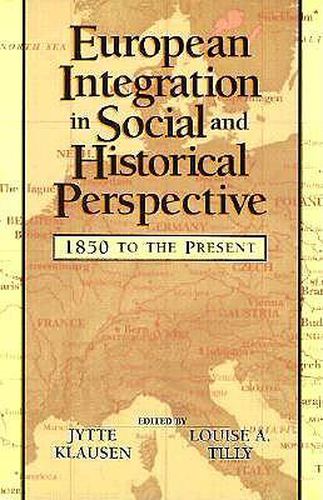Readings Newsletter
Become a Readings Member to make your shopping experience even easier.
Sign in or sign up for free!
You’re not far away from qualifying for FREE standard shipping within Australia
You’ve qualified for FREE standard shipping within Australia
The cart is loading…






Exploring the social dimensions of state formation and European integration, a respected interdisciplinary group of European and North American scholars takes a novel approach to the historical processes of integration. Rather than being led by EU institutions and intergovernmental policy, the contributors argue that integration is primarily influenced by non-state actors: unions, businesspeople, elites, and immigrants. Exploring the historical roots of integration, they trace contemporary integration efforts back to nineteenth-century social action in response to capitalist development. As today, it was a time when internationalism_both that of workers and of capitalists_sustained international cooperation and attempts to define universal standards for welfare and a social dimension to economic development. The reemergence of an integrated Europe as an alternative to the system of states produced by the settlements of 1918 and 1945 has provided a new opening for internationalism. The contributors view this as a positive trend, especially as a counterbalance to intensifying conflicts over growth, the distribution of wealth, welfare, and global access to markets and jobs.
$9.00 standard shipping within Australia
FREE standard shipping within Australia for orders over $100.00
Express & International shipping calculated at checkout
Exploring the social dimensions of state formation and European integration, a respected interdisciplinary group of European and North American scholars takes a novel approach to the historical processes of integration. Rather than being led by EU institutions and intergovernmental policy, the contributors argue that integration is primarily influenced by non-state actors: unions, businesspeople, elites, and immigrants. Exploring the historical roots of integration, they trace contemporary integration efforts back to nineteenth-century social action in response to capitalist development. As today, it was a time when internationalism_both that of workers and of capitalists_sustained international cooperation and attempts to define universal standards for welfare and a social dimension to economic development. The reemergence of an integrated Europe as an alternative to the system of states produced by the settlements of 1918 and 1945 has provided a new opening for internationalism. The contributors view this as a positive trend, especially as a counterbalance to intensifying conflicts over growth, the distribution of wealth, welfare, and global access to markets and jobs.